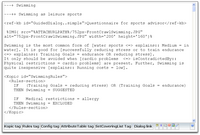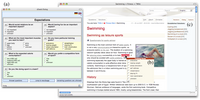KnowWE (Knowledge Editor)
![]() is a Semantic Wiki based the open-source Wiki engine JSPWiki and enhanced by the core libraries of d3web and semantic extensions of the KnowWE project. In detail, we call KnowWE a "Semantic Knowledge Wiki" since it emphasized the development and consumption of explicit problem-solving knowledge.
is a Semantic Wiki based the open-source Wiki engine JSPWiki and enhanced by the core libraries of d3web and semantic extensions of the KnowWE project. In detail, we call KnowWE a "Semantic Knowledge Wiki" since it emphasized the development and consumption of explicit problem-solving knowledge.
Overview
KnowWE implements a (refined) concept of semantic wikis: Besides basic ontological knowledge – such as the definition of classes, taxonomic and user-defined properties – KnowWE is able to represent problem-solving knowledge that is applied on selected classes of the ontology. Every wiki page embeds not only semantically annotated text and multimedia but also explicit problem-solving knowledge. The embedded knowledge can be used to actually derive the concept related to the particular wiki article.
As a typical use case, the user of a semantic knowledge wiki can browse the contents of the wiki in a classic web-style – possibly using semantic navigation and/or semantic search features. Moreover, he/she is also able to start an interactive interview where entering a problem description. Based on these inputs an appropriate list of solutions is presented that are in turn linked to the wiki pages representing the presented solution concepts. Thus, every solution represented in the wiki is considered during the problem-solving process. Instead of using an interactive interview mode the user can enter findings inline by clicking on inline answers embedded in the normal wiki page. These inline answers are generated based on the semantic annotations made in the article.
Knowledge Capture
Semantic annotations and knowledge is edited in the mandatory edit pane of the wiki together with standard wiki content like text and pictures. At the moment KnowWE proposes the textual acquisition of annotations and knowledge in the edit pane, thus a collection of textual markups for annotations and knowledge is required. For a new solution a corresponding wiki page with the solution’s name is created. The wiki page includes describing text in natural language and the explicit knowledge for deriving the solution. In this paper, we introduce the concept of distributed knowledge engineering with knowledge wikis, and we demonstrate the methods and techniques using the toy application of a sports advisor wiki. The running example considers a wiki providing knowledge about different forms of sports, both in textual and in explicit manner. Explicit knowledge can be used to derive an appropriate form of sport for interactively entered (user) preferences.
For example, in Figure 1 we see the edit pane of an article describing the form of sports “Swimming”: Standard text is semantically annotated by the particular properties explains and isContradictedBy for which their meaning is described in the following. Additionally, the first part of a formalized rule base is shown at the bottom of the edit pane. Here, knowledge for deriving and excluding the solution “Swimming” is defined. Besides rules derivation knowledge can be formalized in different forms, for example, explicit set-covering models, structured texts, semantic knowledge annotations.
Knowledge Sharing and Consumption
Besides standard ways of knowledge sharing in (semantic) wikis like (semantic) searching and browsing we provide two ways for a more interactive knowledge sharing in knowledge wikis: first, every wiki page can generate an interactive interview from the included knowledge base by asking questions represented by the findings used in the knowledge base, as for example depicted in Figure 2a. Second, semantic annotations in text are used to offer inline answers, i.e., clickable text in the article asking for meaningful facts corresponding with the highlighted text, cf. Figure 2b. In both ways a new finding instance is entered into the knowledge wiki corresponding to the clicked finding object.
With the use of a broker/blackboard architecture we are able to propagate entered findings to all knowledge bases included in the wiki. Such a distributed problem-solving process incorporates the multiple knowledge bases of the wiki simultaneously. In consequence, all solutions represented in the knowledge wiki can be derived at any page; already derived solutions are presented at the right pane of the wiki as for example shown in Figure 2c. Here, the solutions ”Cycling” and ”Jogging” were derived as the most appropriate solutions, even though the findings were entered on the page describing the solution ”Swimming”. The presented example can be seen as a specialized case of semantic navigation.
Further Information
Maintainers
The system family d3web and KnowWE is now maintained as open-source project at http://www.d3web.de.
Current publications:
- Baumeister, J.; Reutelshoefer, J.; Belli, V.; Striffler, A.; Hatko, R.; Friedrich, M.: KnowWE - A Wiki for Knowledge Base Development, The 8th Workshop on Knowledge Engineering and Software Engineering (KESE2012)
- Baumeister, J.; Reutelshoefer, J.; Puppe, F.: KnowWE: A Semantic Wiki for Knowledge Engineering, Applied Intelligence (2011). 35(3) 323-344.
- Baumeister, J.; Puppe, F.: Web-based Knowledge Engineering using Knowledge Wikis, Proc. of the AAAI 2008 Spring Symposium on "Symbiotic Relationships between Semantic Web and Knowledge Engineering", pp. 1-13, Stanford University, USA, 2008
- Reutelshoefer, J.; Baumeister, J.; Puppe, F.: Ad-Hoc Knowledge Engineering with Semantic Knowledge Wikis, Proc. of SemWiki 2008 - The Wiki Way of Semantics, Workshop co-located with the 5th European Semantic Web Conference (ESWC), Tenerife, Spain, June 02, 2008
- Baumeister, J.; Reutelshoefer, J.; Puppe, F.: KnowWE - Community-based Knowledge Capture with Knowledge Wikis, Proc. of the 4th International Conference on Knowledge Capture (KCAP), 189-190, ACM Press, 2007
- Baumeister, J.; Reutelshoefer, J.; Puppe, F.: Markups for Knowledge Wikis, Proc. of Semantic Authoring, Annotation and Knowledge Markup Workshop (SAAKM), 7-14, Whistler, Canada, 2007



